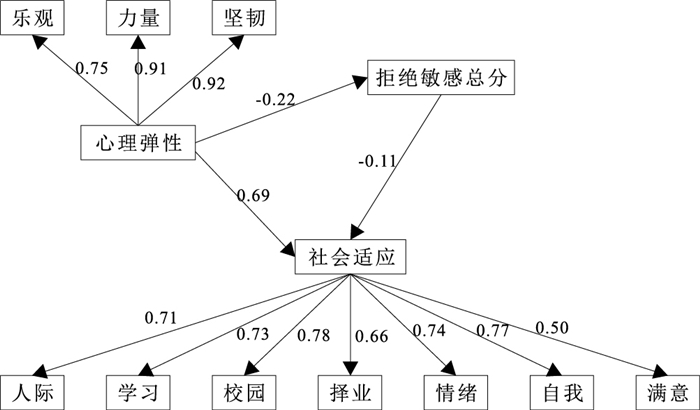The role of rejection sensitivity in the relationship between the psychological resilience and social adaptability of college students with left-behind experience
-
摘要:
目的 探索童年期留守经历大学生拒绝敏感性在心理弹性与社会适应性关系中的作用,为高校学生能够更好地适应社会提供参考。 方法 采用分层整群抽样方法,抽取安徽省4所高校3 418名大学生,采用自编社会人口学及留守因素问卷、心理弹性量表(CD-RISC)、中国大学生适应量表(CCSAS)及拒绝敏感性量表(RSQ)进行调查,并利用AMOS 21.0构建拒绝敏感性、心理弹性和社会适应关系的结构方程模型。 结果 有留守经历大学生1 324名,与无留守经历大学生相比[(64.47±13.79)(197.90±25.57)(10.86±2.98)分],有留守经历大学生的心理弹性、社会适应性水平及拒绝敏感度更低[(63.26±13.69)(195.14±24.60)(10.45±2.91)分](t值分别为-2.50,-3.12,-3.87,P值均 < 0.05);相关分析结果显示,有留守经历大学生拒绝敏感性与社会适应性、心理弹性均呈负相关(r值分别为-0.24,-0.22,P值均 < 0.01),社会适应性与心理弹性呈正相关(r=0.64,P < 0.01);模型拟合结果表明,心理弹性通过拒绝敏感性影响社会适应性的中介路径有统计学意义(中介效应值=0.02,95%CI=0.01~0.05,P < 0.05)。 结论 心理弹性和社会适应性水平在童年期有留守经历大学生群体较无留守经历大学生群体低,且拒绝敏感性在有留守经历大学生心理弹性与社会适应性的关系中存在中介作用。 Abstract:Objective To explore the role of rejection sensitivity in the relationship between the psychological resilience and social adaptability of college students with left-behind experience, so as to provide reference for college students to beffer adapt to the society. Methods Self-designed questionnaire, the Conor-Davidson Resilience Scale(CD-RISC), the Chinese College Students Adaptation Scale(CCSAS), and the Rejection Sensitivity Questionnaire (RSQ) were administered among 3 418 college students from four universities in Anhui Province with the stratified cluster sampling method. This research investigation used AMOS version 21.0 to construct a structural equation model of rejection sensitivity, psychological resilience, and social adaptability, to analyze the mediation effect. Results There were 1 324 college students with lefe-behind experience. Compared with college students without left-behind experience[(64.47±13.79)(197.90±25.57)(10.86±2.98)], students with left-behind experience exhibited lower levels of psychological resilience, social adaptability, and rejection sensitivity[(63.26±13.69)(195.14±24.60)(10.45±2.91)](t=-2.50, -3.12, -3.87, P < 0.05); Rejection sensitivity was negatively associated with social adaptability, and psychological resilience among college students with left-behind experience(r=-0.24, -0.22, P < 0.01), while social adaptability was positively correlated with psychological resilience(r=0.64, P < 0.01). The results of the mediation model showed that psychological resilience affected the mediation path of social adaptability by rejection sensitivity (mediation effect value=0.02, 95%CI=0.01-0.05, P < 0.05). Conclusion Left-behind experience had a negative impact on the psychological resilience and social adaptability of undergraduates. With respect to the psychological resilience of undergraduates with left-behind experience, rejection sensitivity played a mediating role in the social adaptability relationship. -
Key words:
- Rejection(psychology) /
- Social adjustment /
- Mental health /
- Students
-
表 1 留守和非留守经历大学生各量表得分比较(x±s)
Table 1. Comparison of scores of various scales between left-behind and non-left-behind college students(x±s)
组别 人数 乐观性 力量性 坚韧性 心理弹性总得分 人际关系适应 学习适应 留守经历 1 324 9.69±2.40 21.45±4.60 32.12±7.67 63.26±13.69 32.82±5.00 35.28±6.62 非留守经历 2 094 9.98±2.45 21.71±4.69 32.78±7.77 64.47±13.79 33.14±5.30 35.89±6.50 t值 -3.40 -1.57 -2.43 -2.50 -1.75 -2.67 P值 0.00 0.12 0.02 0.01 0.08 0.01 组别 人数 校园生活适应 择业适应 情绪适应 自我适应 满意度 适应性总得分 拒绝敏感性 留守经历 1 324 26.13±4.60 29.05±4.17 30.28±4.14 26.45±4.68 15.13±3.28 195.14±24.60 10.45±2.91 非留守经历 2 094 26.50±4.57 29.47±4.25 30.49±4.24 26.87±4.70 15.55±3.39 197.90±25.57 10.86±2.98 t值 -2.31 -2.80 -1.42 -2.54 -3.54 -3.12 -3.87 P值 0.02 0.01 0.16 0.01 0.00 0.00 0.00 表 2 不同性别有留守经历大学生各量表得分比较(x±s)
Table 2. Comparison of scores on the scales of college students of different genders with left-behind experience (x±s)
组别 人数 乐观性 力量性 坚韧性 心理弹性总得分 人际关系适应 学习适应 男 737 9.76±2.40 21.49±4.68 32.61±7.50 63.86±13.46 32.93±5.07 34.91±6.65 女 587 9.60±2.44 21.42±4.60 31.50±7.84 62.52±13.95 32.69±4.92 35.73±6.57 t值 1.21 0.27 2.62 1.77 0.86 -2.24 P值 0.23 0.79 0.01 0.08 0.39 0.03 组别 人数 校园生活适应 择业适应 情绪适应 自我适应 满意度 适应性总得分 拒绝敏感性 男 737 26.25±4.60 28.99±4.29 29.97±4.30 26.61±4.75 15.16±3.24 194.82±25.14 10.94±2.94 女 587 25.97±4.60 29.13±4.01 30.67±3.91 26.26±4.58 15.09±3.32 195.55±23.94 10.76±3.03 t值 1.11 -0.60 -3.07 1.36 0.35 -0.53 1.12 P值 0.27 0.55 0.00 0.17 0.73 0.60 0.26 表 3 留守经历大学生拒绝敏感性心理弹性与社会适应力各维度相关分析(r值,n=1 324)
Table 3. An analysis of the correlation rejection sensitivily, psychological resilience and social adaptability of college students with left-behind experience(r, n=1 324)
变量 拒绝敏感性 心理弹性 社会适应性 乐观性 力量性 坚韧性 总分 人际关系适应 学习适应 校园生活适应 择业适应 情绪适应 自我适应 满意度 乐观性 -0.20 力量性 -0.20 0.68 坚韧性 -0.21 0.70 0.84 心理弹总分 -0.22 0.80 0.93 0.97 人际关系适应 -0.22 0.37 0.44 0.46 0.48 学习适应 -0.14 0.29 0.49 0.47 0.48 0.45 校园适应 -0.22 0.38 0.49 0.49 0.51 0.57 0.59 择业适应 -0.16 0.30 0.46 0.45 0.46 0.48 0.63 0.51 情绪适应 -0.19 0.36 0.52 0.48 0.51 0.56 0.51 0.59 0.43 自我适应 -0.22 0.42 0.56 0.55 0.57 0.56 0.52 0.57 0.46 0.62 满意度 -0.13 0.30 0.34 0.36 0.37 0.29 0.43 0.45 0.25 0.34 0.40 社会适应性总分 -0.24 0.46 0.63 0.62 0.64 0.75 0.82 0.81 0.72 0.76 0.78 0.57 注: P值均 < 0.01。 表 4 留守经历大学生心理弹性拒绝敏感性与社会适应性关系结构方程模型分析(n=1 324)
Table 4. Structural equation modeling analysis of the relationship between psychological resilience, rejection sensitivity and social adaptability of college students with left-behind experience(n=1 324)
方向 效应值 效应值95%CI 心理弹性→拒绝敏感性 -0.22 -0.28~-0.17 拒绝敏感性→社会适应性 -0.11 -0.16~-0.06 心理弹性→社会适应性 0.69 0.65~0.73 注: P值均 < 0.01。 表 5 留守经历大学生心理弹性、拒绝敏感性与社会适应性关系结构方程模型拟合优度检验(n=1 324)
Table 5. The goodness of fit test of structural equation modeling for the relationship between psychological resilience rejection sensitivity and social adaptability of college students with left-behind experience(n=1 324)
结构方程模型 χ2/df值 GFI值 AGFI值 NFI值 IFI值 CFI值 RMSEA值 M1 294.81/20 0.96 0.90 0.93 0.90 0.93 0.10 M2 389.75/34 0.94 0.91 0.95 0.93 0.95 0.09 M3 406.25/42 0.95 0.91 0.94 0.95 0.95 0.08 注: M1纳入拒绝敏感性和社会适应性,M2纳入心理弹性和社会适应性,M3纳入心理弹性、拒绝敏感性和社会适应性。 -
[1] 余霞, 冯跃芳. "留守经历"大学生心理问题成因与对策研究[J]. 河北青年管理干部学院学报, 2017, 29(6): 30-33. https://www.cnki.com.cn/Article/CJFDTOTAL-QNGX201706006.htmYU X, FENG Y F. Research on the causes and countermeasures of psychological problems of college students with left-behind experience[J]. J Hebei Youth Cadres Administr Coll, 2017, 29(6): 30-33. https://www.cnki.com.cn/Article/CJFDTOTAL-QNGX201706006.htm [2] 张万里. 浅析有"留守经历"大学生的问题及对策[J]. 农村经济与科技, 2017, 28(6): 263. doi: 10.3969/j.issn.1007-7103.2017.06.189ZHANG W L. Analysis on the problems and countermeasures of college students with left-behind experience[J]. Rural Econ Sci Technol, 2017, 28(6): 263. doi: 10.3969/j.issn.1007-7103.2017.06.189 [3] 潘贵霞, 李兵, 王静, 等. 有留守经历的大学生儿童期虐待与心理健康状况[J]. 中华疾病控制杂志, 2019, 23(7): 840-844. https://www.cnki.com.cn/Article/CJFDTOTAL-JBKZ201907019.htmPAN G X, LI B, WANG J, et, al. Status of childhood abuse and mental health in college students with left-behind experience[J]. Chin J Dis Control Prev, 2019, 23(7): 840-844. https://www.cnki.com.cn/Article/CJFDTOTAL-JBKZ201907019.htm [4] 申蕤, 温义媛. 有留守经历大学生社会支持、应对方式与社会适应的关系研究[J]. 科教导刊(中旬刊), 2010(12): 7-8. https://www.cnki.com.cn/Article/CJFDTOTAL-KJDS201024005.htmSHEN R, WEN Y Y. Relationship between social support students with left-behind experience, coping style and social adjustment[J]. Guide Sci Educ, 2010(12): 7-8. https://www.cnki.com.cn/Article/CJFDTOTAL-KJDS201024005.htm [5] 章超. 大学生成人依恋、拒绝敏感性与社会适应性的关系[D]. 桂林: 广西师范大学, 2014.ZHANG C. Relationship between college students' adult attachment, rejective sensetivity and social adaptability[D]. Guilin: Guangxi Normal University, 2014. [6] 徐滨, 宋倩, 张建华, 等. 留守经历大学生童年期创伤的影响因素[J]. 中国学校卫生, 2020, 41(6): 889-892. doi: 10.16835/j.cnki.1000-9817.2020.06.024XU B, SONG Q, ZHANG J H, et, al. Determinants of childhood trauma among college students with left-behind experience[J]. Chin J Sch Health, 2020, 41(6): 889-892. doi: 10.16835/j.cnki.1000-9817.2020.06.024 [7] SHI J, CHEN Z, YIN F, et al. Resilience as moderator of the relationship between left behind experience and mental health of Chinese adolescents[J]. Int J Soc Psychiatry, 2016, 62(4): 386-393. doi: 10.1177/0020764016636910 [8] 于肖楠, 张建新. 自我韧性量表与Connor-Davidson韧性量表的应用比较[J]. 心理科学, 2007, 30(5): 1169-1171. doi: 10.3969/j.issn.1671-6981.2007.05.038YU X N, ZHANG J X. A comparison between the Chinese version of ego-resiliency scale and connor-davidson resilience scale[J]. Psychol Sci, 2007, 30(5): 1169-1171. doi: 10.3969/j.issn.1671-6981.2007.05.038 [9] 教育部《大学生心理健康测评系统》课题组, 方晓义, 沃建中, 等. 《中国大学生适应量表》的编制[J]. 心理与行为研究, 2005(2): 95-101. https://www.cnki.com.cn/Article/CJFDTOTAL-CLXW200502002.htmResearch Group of College Student Mental Health Evaluation System, FANG X Y, WO J Z, et al. Development of Chinese college student adjustment scale[J]. Stud Psychol Behav, 2005(2): 95-101. https://www.cnki.com.cn/Article/CJFDTOTAL-CLXW200502002.htm [10] DOWNEY G, FELDMAN S, AYDUK O. Rejection sensitivity and male violence in romantic relationships[J]. Person Relat, 2010, 7(1): 45-61. [11] 温永慧. "留守经历"大学生适应性问题与教育引导策略[J]. 山东青年政治学院学报, 2018, 34(5): 58-62. https://www.cnki.com.cn/Article/CJFDTOTAL-SDQG201805014.htmWEN Y H. Educational and instructional strategies for adjustment of college students with left-behind experience in childhood[J]. J Shandong Youth Univ Polit Sci, 2018, 34(5): 58-62. https://www.cnki.com.cn/Article/CJFDTOTAL-SDQG201805014.htm [12] 李翹彤. 高校留守经历大学生心理健康状况调查研究[D]. 沈阳: 沈阳航空航天大学, 2017.LI Q T. Investigation and research on psychological health status of college leftover students experienced[D]. Shenyang: Shenyang Aerospace University, 2017. [13] 甘良梅. 留守经历对高职生心理韧性及心理健康的影响研究[J]. 芜湖职业技术学院学报, 2017, 19(2): 87-89. doi: 10.3969/j.issn.1009-1114.2017.02.022GAN L M. On the influence of left-behind experience on psychological resilience and mental health in higher vocational institutes[J]. J Wuhu Instit Technol, 2017, 19(2): 87-89. doi: 10.3969/j.issn.1009-1114.2017.02.022 [14] 徐建财, 邓远平. 农村留守儿童生活经历对男女大学生人格发展的差异影响[J]. 重庆科技学院学报(社会科学版), 2012(20): 101-103. https://www.cnki.com.cn/Article/CJFDTOTAL-CQGY201220038.htmXU J C, DENG Y P. The influence of the life experiences of left-behind children in rural areas on the personality development of male and female college students[J]. J Chongqing Univ Sci Technol(Soc Sci Edit), 2012(20): 101-103. https://www.cnki.com.cn/Article/CJFDTOTAL-CQGY201220038.htm [15] 郝丽, 于芳, 付奕. 体育专业大学生心理弹性、社会支持、社会适应状况及其关系研究[J]. 体育研究与教育, 2017, 32(1): 104-108. https://www.cnki.com.cn/Article/CJFDTOTAL-SXST201701023.htmHAO L, YU F, FU Y. Research on psychological resilience, social support, social adaptation and the relationship of college students majoring in physical education[J]. Sports Res Educ, 2017, 32(1): 104-108. https://www.cnki.com.cn/Article/CJFDTOTAL-SXST201701023.htm [16] 赵延良. 基于心理弹性的大学生心理健康促进模式研究[J]. 中国卫生产业, 2019, 16(6): 152-153. https://www.cnki.com.cn/Article/CJFDTOTAL-WSCY201906070.htmZHAO Y L. Research on college students' mental health promotion model based on psychological resilience[J]. Chin Health Ind, 2019, 16(6): 152-153. https://www.cnki.com.cn/Article/CJFDTOTAL-WSCY201906070.htm [17] 王佳, 袁昕, 蒋娟, 等. 大学生拒绝敏感性在成人依恋与抑郁症状间的中介效应[J]. 中华行为医学与脑科学杂志, 2020, 29(6): 556-560. doi: 10.3760/cma.j.cn371468-20191206-00892WANG J, YUAN X, JIANG J, et, al. Mediating effects of rejection sensitivity between adult attachment and depressive symptoms in college students[J]. Chin J Behav Med Brain Sci, 2020, 29(6): 556-560. doi: 10.3760/cma.j.cn371468-20191206-00892 [18] 张艺. 拒绝敏感性与社交焦虑及社交回避: 情绪调节策略和性别的作用[D]. 南京: 南京师范大学, 2019.ZHANG Y. Refusal sensitivity, social anxiety and social avoidance: the role of emotion regulation strategies and gender[D]. Nanjing: Nanjing Normal University, 2019. [19] 王丽霞. 大学生心理弹性的保护性因素: 社会支持、家庭亲密度及适应性、情绪调节方式的作用机制研究[D]. 重庆: 西南大学, 2016.WANG L X. The protective factors of resilience of college students: the mechanism of social support, family cohesion and adaptability and emotion regulation[D]. Chongqing: Southwest University, 2016. -







 下载:
下载:

